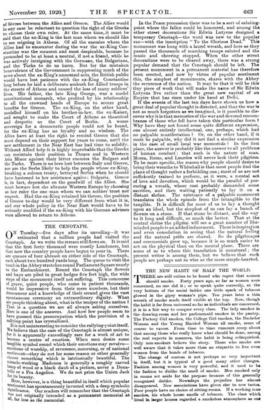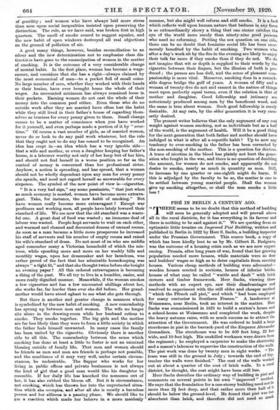THE NEW HABIT OF HALF THE WORLD.
'WHERE are still critics to be found who regret that women should smoke. Forty years ago, so far as women were concerned, no one did it ; or to speak quite correctly, at the very bottom of the social ladder one little spark of tobacco .glowed in the gipsy woman's pipe. Ten years later a thin wreath of smoke made itself visible at the top. Now, though the habit is far from universal se far as individuals are concerned, it is in a fair way, to conquer every class. The lady smokes in the drawing-room and her parlourmaid smokes in the pantry. The Factory Girl smokes, the College Girl smokes, the Bachelor Woman and the Young Married Woman all smoke, some of course to excess. From time to time rumours creep about that among those who really know what should be done, among the real experts in manners, the habit is being relinquished. Only non-smokers believe the story. Those who smoke are well aware that it takes more than an etiquette to free even women from the bonds of tobacco.
The change of custom is not perhaps so very important in itself, but it is typical of a good many other changes. Fashion among women is very powerful, and it used to be the fashion to dislike the smell of smoke. Men smoked only in rooms set aside for the purpose because of this generally recognized dislike. Nowadays the prejudice has almost disappeared. New associations have given the to now tastes. Poor people have no choice of sitting-rooms. If a working man smokes, his whole house smells of tobacco. The claw which lived in larger houses regarded a smokeless atmosphere as on, of gentility ; and weixien whii- have always -laid more stress than men upon social inequalities insisted upon preserving the distinction. The rule, as we have said, was broken first in high quarters: The smell of smoke ceased to suggest squalor, and the new habit of open windows destroyed all real objections on the ground of pollution of air.
A good many, things, however, besides reconciliation to an odour and the new determination not to emphasize class dis- tinctioas have gone to the emancipation of women in the matter of smoking. It is the outcome of a very considerable change of Mental habit. lathe first Place, woman has &mine a wage- earner, and considers that she has a right—always claimed by the most . economical of men—to a pocket full of small coins. No large number of men, whetter they worked with their hands or their brains, have ever brought home the 'whole of their wages. An uncounted minimum has always remained loose in their pockets. Earning women do not cast the whole of their money into the common pool either. Even those who do no outside work after they are married have often lost the habit while they still lived in their fatb.erS house of regarding them- selves as trustees for every penny given to them. Small change ceases to be a matter of conscience when you have worked for it yourself, and even perhaps made a portion of it by "over- time." .01 course a vast number of girls, as of married women, never do or look to do any paid work whatever, but the rule that they ought not to do any has ceased to be recognized. An idea has crept in—an idea which has a very ignoble side— that a Wife and mother, or even a daughter keeping her father's Mouse, is a labourer worthy not only of her keep but of her hire, and should not find herself in a worse position so far as the control of money is concerned than her professional sister. Anyhow, a notion is spreading, and has spread, that a woman should not be wholly dependent upon any man for every penny she spends, and need not regard herself as answerable for every sixpence. The symbol of the new point of view is—cigarettes.
"It is a very bad sign,". say some pessimists, "that just when so much economy is needed, women have become more extrava- gant. Take, for instance, the new habit of smoking." But have women really become more extravagant ? Except war profiteers and working men, all people havelately lowered their standard of life. We see now that the old standard was a waste- ful one. A great deal of food was wasted ; an immense deal of labour was wasted. People kept servants to wait on each other, and warmed and cleaned and decorated dozens of unused rooms. As soon as a man became a little more prosperous he increased his staff of servants and his number of empty rooms and raised his wife's standard of dress. Do not most of us who are middle aged remember many a Victorian household of which the mis- tress, while spending more and more on her weekly bills and monthly wages, upon her dressmaker and her laundress, was rather proud of the fact that her admirable housekeeping was always" a tight fit," and that she thought twice before she bought an evening paper? All this ordered extravagance is becoming a thing of the past. We all try to live in a humbler, easier, and more really dignified manner. Meanwhile, if the woman smokes a few cigarettes and has a few uncounted shillings about her, she works far, far harder than ever she did before. Her grand- mother would have stood aghast to see what she gets through.
But there is another and greater change in manners which is symbolized by the new habit of smoking. A new comradeship has sprung up, between men and women. The wife no longer sits alone in the drawing-room while her husband retires to sinoke. They smoke together. The big girls and the mother are far less likely than they were to form a little society in which the father feels himself unwanted. In many cases- the family has been united by the cigarette. Obviously there is another side to all this. The comradeship between the sexes which smoking has done- at least a little to foster is not an unmixed blessing outside of family life. That men and women should be friends as men and men are friends is Perhaps not possible, and the semblance of it may very well, under certain circum- stances, be undesirable. The flapper who works for . her living in public offices and private businesses is not always the kind of girl that a good man would like his daughter to resemble. If her daily life has knocked the nonsense out of her, it has also rubbed the bloom off. But it is circumstance, not smoking, which has thrown her into the unprotected situa- tion which she occupies, and after all she is mostly a harmless person and her silliness is a passing phase. We should like to ape a reaction which made her behave in a more maidenly manner, but she might well reform and still smoke. It la a fact which reflects well upon human nature that badness in any form is so extraordinarily showy a thing that- one sinner catches. the eye of the world more Surely than ninety-nine good persons who need no reforming. Putting the sex question on one side, there can be no -doubt that feminine social life has been 'enor- mously benefited by the habit of smoking. Two women who after a day's work sit by the fire in the evening are likely to enjoy their talk far More if they smoke than if they do not. We do not imagine that wit or depth is supplied to their words by the cigarette between their fingers, but the illusion of both is pro- duced; the pauses are less dull, and the sense of pleasant com- panionship is more vital. Moreover, smoking does in a remark- able degree bridge the gulf of years. A woman of fifty and a woman of twenty-five do not and cannot in the nature of things meet upon perfectly equal terms, even if the relation is that of mother and daughter. Good fellowship and intimacy are notoriously produced among men by the beneficent weed, and the same is true about women. Such good fellowship is surely desirable. At any rate, by the elder generation it is very, earn. estly desired. - The present Writer believes that,the only argument of any real weight -against women Smoking, net as individuals but as a half of the World, is the argument of health. Will it be a good thing for the next generation that both father 'end mother should have indulged in what is after all a soporific) habit? Up to now any tendency to over-smoking in the father has been corrected by the non-smoking of the mother. This is a question for &iota's. A trace of nicotine in the blood has plainly not hurt the gener- ation who fought in the war, and there is no question of doubling the amount, for women do not smoke:- and apparently do not desire to smoke, nearly as much in quantity as men. Still, to increase by one quarter or one-eighth might do harm. If this is adjudged by the faculty to be so, the matter is one to be settled between young married people.. Shall the woman -give up smoking altogether, or shall the man smoke, a little less



































 Previous page
Previous page